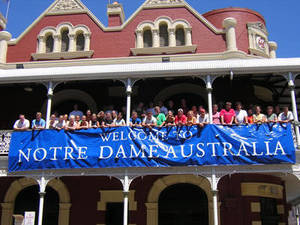 "
"
“Transformation: that is our goal — to change your life. Open your eyes to new opportunities, to new possibilities,” Kathleen Opel, director of study abroad at Notre Dame, says. Eager to share the numerous benefits of study abroad, Opel warmly recounts personal experiences as well as student feedback in order to give real life examples to her points.
“I think one of the greatest benefits is coming to appreciate the other culture you are living in,” Obel says. “Then, those things you appreciate, you consider, ‘well, how will [you] bring these back and integrate them into your life here?’” Using the example of Dublin, Opel predicts that some aspects of the Irish culture could easily be integrated into student life here, such as music or the ability to strike up a friendly conversation with anyone. The student also realizes more about his or her “home” culture through comparison with another.
Not only does a student who studied abroad return with social skills, but also valuable practice with adapting, asking for help and using different modes of communication. When faced with a language barrier, for example, students must learn new forms of communication, such as gestures, in order to succeed. Opel remembers from her own experience when someone once led her by the arm to a shop because they could not speak each other’s languages.
These enriching skills not only benefit the students immediately, but also in the long run as they search for jobs. “Observe, adapt, communicate… This is something that is a useful skill, not just while you’re abroad, but when you come back,” Opel says. In an increasingly globalized world in which nearly every job includes interactions with people of other cultures, the abilities of adapting, learning, listening, observing and communicating are crucial skill sets.
Opel routinely checks studies done on how the study abroad experience sets students apart in the job market. “Students who studied abroad tended to get jobs earlier,” she says. She believes that the personal development achieved through study abroad, including building up a set of skills that applies to a culturally diversified job market, distinguishes students from their peers who did not study abroad.
If major advantages in the hunt for jobs are not enticing enough, there is also a personal incentive. “One of the things that’s amazing to see is sometimes, when there is someone who is shy, quiet… [You think], ‘are they going to be able to negotiate these [cultural] differences?’ And what you find is that once you find some success, you build confidence — confidence in your ability to communicate or navigate,” Opel says. Thus study abroad not only provides a marketable skill set, a globalized view of the world and irreplaceable memories, but also the chance to grow and transform — the chance to change your life.
Interested in learning more? Contact Kathleen Opel at kopel@nd.edu or check out more information online at Notre Dame International’s website (http://international.nd.edu/education-abroad/study-abroad/istanbul-turkey/).